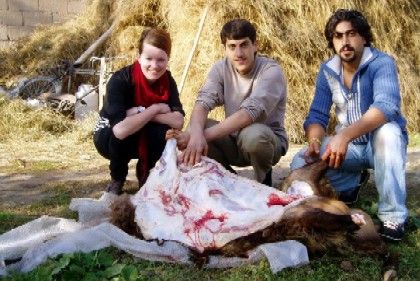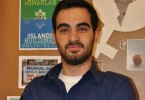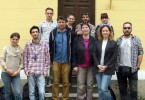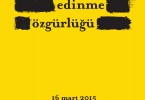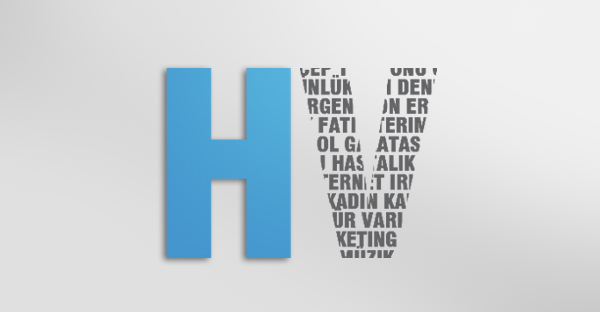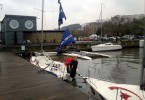Iva Hromkova
Taking advantage of the long holiday in November I set up on a road trip to the east of Turkey. I was accompanied by one Czech boy but after reaching Trabzon we split up and the whole plan crashed. Left alone without a map I decided to go into the deeper east of Turkey’s east.
My road trip supposed to be ten days journey to southeastern Turkey with a friend. A day before the holidays started I arrived in Eskisehir to pick him up. After two days there we took a night minibus to Samsun and continued along the Black Sea to Ordu, Unye and after reaching Trabzon on Monday we planned to go to the south of Turkey to Van, Mardin and Diyarbakir. But our plan changed.
Leaving Trabzon
Trabzon is one of the most beautiful cities near Black sea, they said, but I wasn’t impressed by the town at all. It was as crowded and fussy as Istanbul.
I left the city center as soon as I could. One lady in abaya (whole black dresses) advised me to take the bus to the Trabzon intercity bus terminal I asked for a bus to Diyarbakir but an old Turk with good English kindly told me there is no bus going directly to that town but there is one bus leaving in ten minutes to Erzurum, which is on the way to south. I gave a man behind the counter at the bus station thirty lira and got on the bus without a ticket, I had received just a little post-it, where the number of my seat was written. I guess the man at the counter was too busy to write me a proper ticket.
In five minutes I was sitting in a bus to Erzurum. I didn’t even know where Erzurum was. The plan was to arrive there after five o’clock, find a hotel and the next day to continue to Diyarbakir or Mardin.
On a bus to the east
Five hours long journey by bus was never-ending. There was a young boy vomiting in the seat in front of me all the time, on the TV there was some silly soap opera with too much drama and screaming going on and a young steward just kept offering cheap lemon cologne to refresh passengers’ hands but some of the men put the cologne also on their hair.
On our first stop we pulled into one of the smallest villages with a mosque I have ever seen. It was called Hamsikoy. During the stop a Muslim girl covered in hijab came to me and asked me about my name in English. She introduced herself as Nejla. She was also going home for the oncoming religious holiday. She told me she admired that I’m travelling like this all alone in eastern Turkey and that she also wanted to travel the world. I replied that there’s nothing to admire me for. To buy a ticket to an unknown place in five minutes and then to get on a bus is something what just a fool can do.
Along the one hundred kilometers to Erzurum the countryside changed. Majestic mountains have turned into plains with brown earth; we were passing by towns built up in the middle of nowhere. That’s where I realized that if I didn’t go in the east, I would never know how real Turkey looks like. Istanbul is Babel. Eskisehir combines Turkish culture with the West European one. Towns near the Black Sea are like every other sleepy seaside resort. But when you get to inland, you suddenly see what makes Turkey.
Endless mountain ranges where villages are hidden. Rusty buildings, women in headscarves, no greenery just a plain field with mosques even in the smallest settlements, overcrowded markets, carelessly built roads, houses on the hills with snow, telegraph poles and paths crossing the whole scenery. And around half past four in the afternoon you could see the moon.
In a hamlet of only five houses
When we finally reached Erzurum bus station, Nejla, the Muslim girl, asked me where I am going now or if I have any place to stay here. “Not really,” I said. After a little talk, Nejla offered me if I wanted to go with her to her village near Igdir. “What is Igdir?” It is a town near the Armenian border. Another five hours drive after the final destination of our bus. So I exchanged my seat number 15 for 13 and left Erzurum.
I was heading to small Kurdish village Carikci in the very east of eastern Turkey to celebrate Islamic religious holiday Kurban Bayrami with a Kurdish family. According to Quran every family needs to sacrifice an animal on the first day of Bayram, so Nejla told me that her brother was going to cut a ram tomorrow morning. It had already got dark outside, I still didn’t have a map and I still didn’t have a clue where the bus was going. I was quite worried because I was told that I should not travel alone to the east of the country. Ironically, Nejla’s dad had told her that she should not travel alone to Istanbul.
Anyway, no tourist has ever been before in the villages near Igdir. No one from Nejla’s family, her two younger brothers working in Istanbul, her older brother studying pedagogy in Diyarbakir, her four sisters or parents, had ever seen a Czech. And I had never been to a Kurdish village.
Nejla is twenty one years old pedagogy student at the university in Rize. She used to wear a wig to school before the government softened the headscarf ban one month ago. She wants to be a teacher at primary school and teach in the east in Kurdish villages for ten years and then she wants to move to Istanbul, upgrade her education and become a lecturer at university. Her father doesn’t want to let her go alone to Istanbul; he thinks it is too dangerous for her. Her parents would be glad, if Nejla settles down somewhere near Igdir. But apart from that they don’t dictate Nejla anything. Nejla decided all by herself in her sixteen to start to wear a headscarf, she prays five times a day, she doesn’t drink alcohol. She doesn’t have any male friends, she doesn’t go to clubs, she doesn’t like pop music and she wants to start dating after school. Isn’t she a perfect daughter?
They see a Czech for the first time, and maybe the last
Around 10 p.m., after ten hours I spent in a bus and after six hundred kilometers from Trabzon, we reached our destination Igdir. Nejla’s brother had been already waiting for us with a driver in a minibus that took us to their village. It was really freezing outside; the temperature was around 3°C both inside and outside. After fifteen minutes when the amount of the lights outside increased from three to ten, Nejla told me, that this is their village, so we need to get off. The asphalt road ended on the way. We passed few houses and right before the fields started (there was no light in sight), we took off our shoes and entered their home.
There were no decorations on the walls painted in pastel shades, just carpets on the floor, a stove in the middle of the living room, no TV set, no Internet, just a shiny new washing machine next to the fridge in the kitchen and a Turkish toilet ten meters from the house.
Nejla’s family reunion was touching. She hadn’t seen most of them since the summer. We ate our dinner on the floor in the living room, a soup made from tomatoes and eggs and with lavas (Kurdish tortilla). And of course Turkish tea. They drunk it in the way I had never seen, at first they put a cube sugar to their mouth and then drink it down with tea.
After a dinner we tried to have a little conversation with the brothers but I could speak very little Turkish, their mother spoke just Kurdish and no one except Nejla could speak English, so she was the one who translated all from English to Turkish and vice versa. We went to bed around midnight. I slept on a couch in the living room; one of Nejla’s sisters was sleeping on the floor next to me. Outside was still freezing but inside it was warm even though the stove was not burning.
Around 5 a.m. Nejla’s sister accidentally woke me up when she went for the toilet. Even for that she put on her headscarf. After half past seven all women in the house had woken up. Brothers got up an hour later, just on time for a breakfast served again on a cloth spread on the floor. We ate lavas with black olives, goat cheese; something sweet made from the flour and boiled eggs, which seemed like the best invention in the world that morning. Even during the breakfast Nejla’s brothers smoked two cigarettes each. I guess the joke “Who smokes more than one Turk?” “Two Turks” is true after all.
When we finished our breakfast the brothers went outside to prepare the sacrificing of a ram. Meanwhile I talked with Nejla’s little sister about her school. Her favorite subject at school was religious education and she wants to be a teacher just like Nejla and her brother who is studying in Diyarbakir. She was like a small version of Nejla, I thought she also couldn’t wait till she hide her brown hair under the scarf; religion was everything to these people.
The ritual of slaughtering
Animals for Kurban Bayrami are cut only by richer families here, who share the lamb meat with relatives, friends and the poor ones. During the first day of Bayram millions rams are killed to commemorate the memory of Ibrahim who was willing to sacrifice his own son to prove God his obedience but in the end God told him that he can provide him with a ram instead.
Around 9 a.m. I went to the yard to watch how one of the brothers adroitly cut with a knife a ram’s neck. He had been doing that since he had turned sixteen. After he twisted ram’s head, the animal wheezed for the last time and brother started ripping its skin off. Then brothers hang the ram and cut its intestines, with their mother assisting them. It was unforgettable scene to watch a boy in sneakers, jeans and striped sweatshirt eviscerating ram’s stomach.
After this Bayram ritual brothers passed the meat to their sisters to cook it and I went for a walk to explore this Kurdish village. It had fifty citizens but only five houses, in each of them around ten people lived. All of them were Nejla’s relatives. Houses looked the same, one floor, hens and toilet in the garden, satellites on the roof and laundry under the windows.
Happy Bayram
Almost the whole village came to visit Nejla’s family in the morning to wish happy Bayram. Everyone was also curious who is the tall red head girl wandering around their houses. They were really nice and kind to me, even though they could not believe that Nejla met me in the bus and invited me to her home. We spoke each other in Turkish; some of the relatives were on the same level in Turkish language as I was.
Before the lunch Nejla assured me that she will send me safely back home to Istanbul because I told her I didn’t want to bother them during their Islamic Christmas anymore. Then we ate the lamb meat from the ram we cut. It didn’t taste very good but I didn’t want to offend Nejla’s sisters who magically created a roast lamb meat from the animal killed an hour and half ago.
I planned to go by bus back to Igdir and then to Erzurum when I wanted to catch a flight to Istanbul. I could continue more to south or take a twenty four hours long bus ride to Istanbul but I had already felt like I have had enough adventure, lemon cologne and Kurdish language for one Bayram.
Intercepted by a military patrol
I said goodbye to whole family with the uncertain feeling that I will never see them again. Nejla’s brother Sait, the student from Diyarbakir, walked me to the next village to take a bus. Suddenly an army car stopped us. They were asking Sait who I was, what I was doing here and if I had a passport. I didn’t know what was happening, Sait couldn’t speak English so he couldn’t explain me what the soldiers wanted. I obediently gave them my passport and then one soldier commanded us to sit on the back of the car with other three soldiers holding guns. They took us to the next village, during our road we were passing by the remnants of slaughtered animals lying on the street. I almost screamed when I saw all the blood and the other things, but Sait just nodded: ”Bayram.”
When soldiers gave us a lift, they asked if I had experienced any difficulties during my journey. “Problem yok, (No problem)” I replied. After the army car left we started hitchhiking because there was no bus to Igdir at that time (“Bayram.”). The very first car luckily gave us a lift. At Igdir bus station I bought a ticket to Erzurum, but there were still two hours until the departure. Sait insisted to wait with me. It was very strange meeting, I had already used all my Turkish vocabulary, he had already pronounced his few sentences in English, so most of the time while we were drinking tea in an empty coffee in an even more deserted Igdir (“Bayram.”) we kept silent.
On Tuesday afternoon all the stores were closed due to Bayram so the city center looked very dismal. Just groups of boys and men were hanging around, no women with them. It looked like the life in town missed modernization and globalization time. It seemed that they were still waiting for their first McDonald’s.
Going back to the west
At 2 p.m. I got on a bus full of old Kurds, waved to my Kurdish guide and left Igdir for good. On my way back to Erzurum I could finally see the beautiful countryside in the eastern part of Turkey in all its glory. Like in the wonderland, I saw a men sitting on a goat on the hill and small cemetery with white tombstones and a low wall around. Then we rode along the ploughed fields amidst the mountainous region.
On our first stop there were lots of passengers trying to get on a bus with huge boxes and bags given them by their families. But some of them didn’t make it inside because there was no space in the luggage compartment, so they needed to wait for another bus. This is the sad story of Bayram, everyone is trying to get somewhere but not all of them succeed. When I heard about the car accidents that happened on the first day of Bayram, I realized, all Turkey went crazy just like we Europeans do because of Christmas. We want to get to our hometowns on time and visit our families and friends, but in the morning of Christmas day we usually open presents, not animals.
I asked a steward if the bus stops at the Erzurum airport. He didn’t answer, just asked me if I can go with him to sit to the drivers’ seat. They told me that they will drop me somewhere on the way to the airport so I could take a taxi for the rest of the road. Then the co-driver started to ask me how I ended up in Igdir and if I had a phone number. He was around forty, with a belly and bald head.
In twenty minutes bus stopped near by a bus station all because of me, a steward caught me a taxi and for twenty lira (the same price I paid for a bus from Igdir to Erzurum) I went to the airport. Ten minutes later I was passing through the security check to the airport lobby. It was around 7 p.m. and I found out that the first flight to Istanbul is at 11.30 p.m., and there was a half-hour delay. In the lobby almost nobody was waiting, just some families and a group of young people.
After four hours ride in a bus I spent another four hours waiting for my flight at the airport and still had nothing to do. I had not spoken to anyone in eight hours. The only entertaining thing there was the praying rooms for Muslims.
Around 1.30 p.m. I finally arrived in my beloved Istanbul. The city was almost empty. I found out I went 2 000 kilometers to the east and that it was the same distance like from my hometown in the Czech Republic to Istanbul. My road trip was over.

